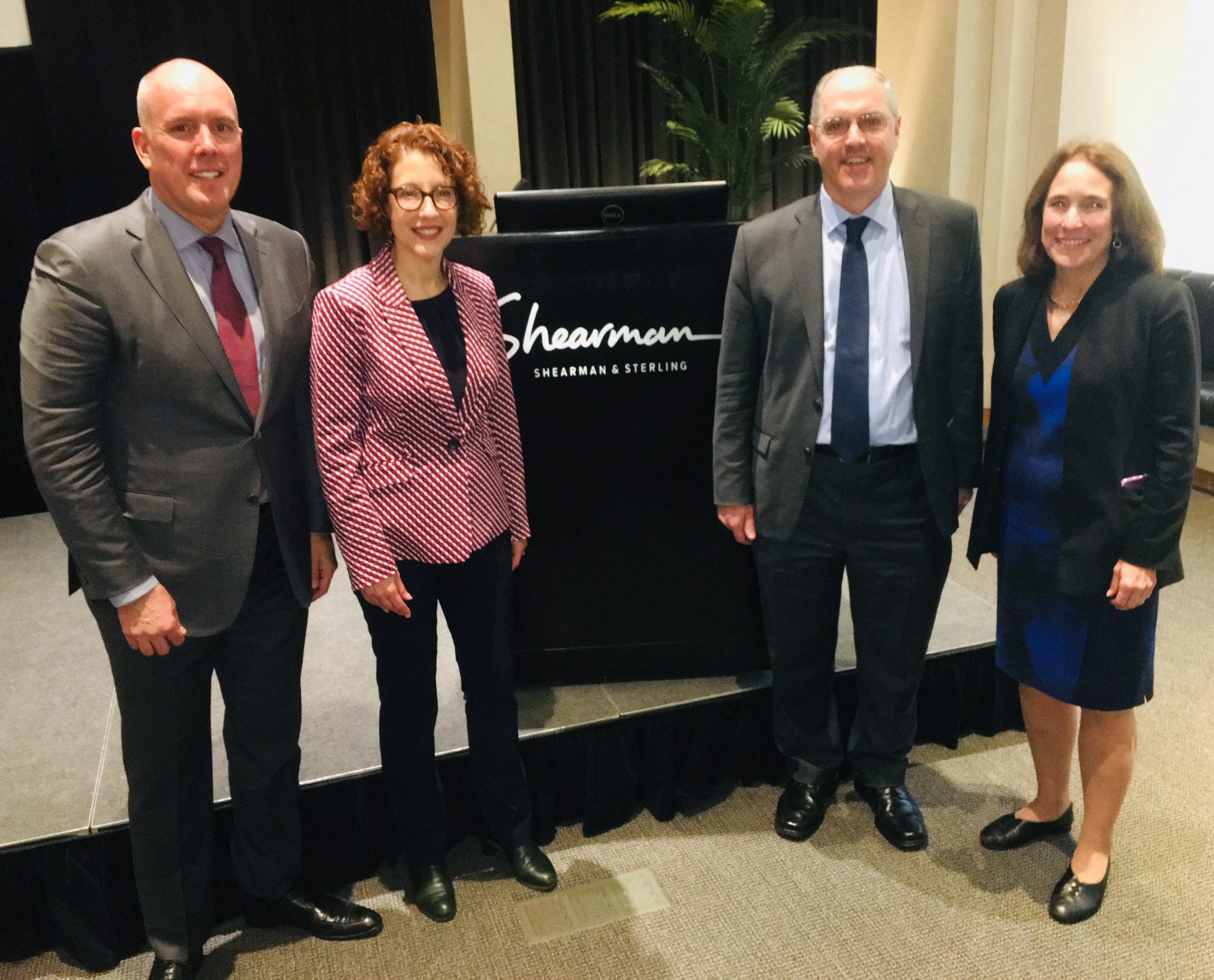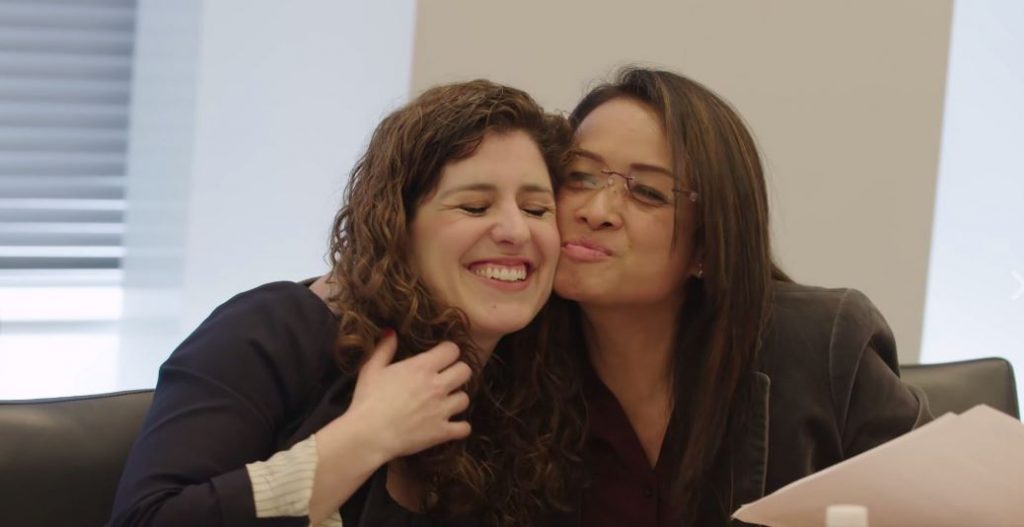
The Real-World Implications of #MeToo: Transforming the Legal Ecosystem (Part V)
A Roundtable Discussion of How Lawyers Can Mitigate Workplace Sexual Harassment
Pictured L to R: Joe Kennedy, Amy Barasch, Dave Curran, Cathy Curry
Feb. 5, 2019
NEW YORK CITY – Our highly successful series “The Real-World Implications of #MeToo—Transforming the Legal Ecosystem” continues to engage conversation around the real world impact of the #MeToo movement on the corporate environment. After four successful roundtable events, the fifth installment in the series—hosted by FiscalNote, Her Justice, Thomson Reuters and Shearman & Sterling LLP—provided senior corporate executives, in-house counsel and law firm attorneys from a variety of business and legal sectors with a unique forum in which to discuss these timely issues.
Dave Curran, Senior Vice President & Chief Business Officer at FiscalNote, moderated the discussion. Joe Kennedy, a committed community organizer and advocate for women’s rights, participated and played a vital role in organizing the event. Curran and Kennedy developed the series, in collaboration with Her Justice, with the purpose of facilitating a top-level exchange of ideas on how #MeToo issues affect the corporate environment and the unique role lawyers can play in addressing those issues.
Curran began the roundtable by sharing an MSNBC video clip focusing on whether anything has really changed after the #MeToo movement. He outlined the goals of the session: an open and honest discussion of issues of sexual assault, harassment and gender diversity in the context of the #MeToo movement in order to develop practical takeaways for corporate and law firm leaders to effect positive change. What are lawyers doing, and what could they do, to protect their clients or their organizations and, at the same time, do the right thing.
Curran then introduced Amy Barasch, Executive Director of Her Justice, a nonprofit that provides free legal services in family, matrimonial and immigration law to New York City women living
in poverty. Barasch provided an overview of Her Justice and how its work relates to the issues surrounding #MeToo. The women Her Justice serves all live in poverty and they represent the ethnic and racial diversity of the New York community. Nearly 40% do not speak English as their primary language and cannot navigate the legal system without an interpreter. Eighty percent have experienced domestic violence. Barasch explained that the commonality between the work of Her Justice and #MeToo is the abuse of power. Sex is merely a tool of control. For Her Justice clients, challenging harassment is not possible given the other barriers they face—poverty, language and immigration status. They don’t have the power to speak. For victims of domestic violence and victims of sexual harassment in the workplace, economic empowerment can help to shift the power balance. Lawyers can play an essential role in correcting that power balance. By recruiting and mentoring lawyers from over 90 NYC law firms and corporations to represent Her Justice clients, Her Justice shifts the power dynamic and achieves safety and economic security for its clients. Barasch commented that there is often a gap between legal ethics, which exist as a floor to protect the legal profession, and moral ethics which establish a higher bar. The aim of the roundtable is to discuss how we can collectively reach that higher level of moral ethics.
Curran then prompted the group conversation with a probing question, “What do you believe has changed since the #MeToo movement?” Participants cited the following post-#MeToo changes, among others:
- Changes in the decision matrix and a movement towards doing what’s right.
- A greater demand for transparency and the recognition that transparency is good for business.
- Risk tolerance.
- More calls and complaints on #MeToo issues.
- An increased perception of the need for a more diverse leadership team and increased concern and attention from corporate boards.
- Potential employees are now more likely to evaluate where they want to work based on potential #MeToo issues in the press about employers. Millenials consider carefully the kind of work environment they want before making career decisions.
- Pressure from in-house counsel on law firms to assign diverse teams and the trend of corporations to hold law firms accountable by reporting on the hours spent by diverse individuals on their legal matters.
- More corporations are conducting trainings about mutual respect, attended by both men and women. Even though these programs are in the early stages, positive outcomes were reported on both individual and company levels.
Participants then shared their own experiences, perspectives and suggestions.
Corporations may have corporate values posted on the wall, but it is also important to incorporate those values in employee trainings and in responses to harassment claims in order to ensure that employees understand them and to establish a culture of respect and empathy.
Several agreed that corporate leadership needs to instill both a top-down and bottom-up approach, which will help in acknowledging and addressing instances of inappropriate behavior within an organization and making it known that the organization will not tolerate sexual harassment and abuse. Corporate boards are starting to take more responsibility but they only know the information that is presented to them by management. One participant commented that, in order to create a culture of transparency, it is essential that the general counsel have a line of access and information to the board, not just the CEO, such as private sessions with the audit committee of the Board. Important are both an examination of the evolving role of the general counsel and an assessment of who the corporate stakeholders are.
Diverse leadership visibly demonstrates the corporate commitment to diversity and inclusion values. Focusing on getting more women in leadership positions will drive change and result in better performance.
Several participants stated that they welcomed an increase in the volume of calls and complaints to corporate hotlines, rather than viewing it as a negative. It is better to be aware of all the issues and identify a “bad apple” early, so that the situation can be addressed before it becomes a crisis. The response team should include representatives of human resources, training, compliance, the general counsel and the communications officer. Working closely with the communications team is important, not to “spin” the story and mitigate damage, but, more importantly, to tell the corporate narrative which is fundamental to unearthing problems in formation and fixing them.
The need to create an inclusive workplace and to start earlier—before a problem arises—was stressed. The business case for these efforts was demonstrated in the results of a 2018 survey of 5,000 women professionals in the legal, finance, technology, energy and healthcare sectors, conducted eight months after the beginning of the #MeToo movement:
- 28% had experienced or witnessed unwanted physical contact in the workplace
- 38% had experienced or witnessed sexual misconduct or harassment in the workplace within the last five years
- 55% are less likely to apply for a job at a company with public #MeToo allegations
- 50% are less likely to buy products or stock from a company with public #MeToo allegations
The repercussions of not doing the right thing have become stronger and more costly. The full survey results are available at https://gender.fticommunications.com/pdf/MeToo_at_Work-research.pdf.
Also discussed was the role lawyers can play through appropriate due diligence in protecting an organization from bringing in “bad actors” from other organizations.
Although the public dialogue is monopolized by the extreme, high-profile cases, one participant cautioned that we should not lose sight of the smaller, often more difficult, scenarios to address, such as two drunk employees who end up in a hotel room together. It is difficult to draw hard lines when there may be mixed culpability. Too often decisions are made based on seniority.
Although there have been more complaints about arbitration agreements in the last 18 months, one participant cautioned that many cases may not get resolved without them.
All these issues are even more complicated for international organizations attempting to adopt a global approach to diversity, inclusion and ethical behavior in a way that will be understood and accepted in offices in many different countries with distinct cultures.
Towards the end of the discussion, the group considered what steps each of them could take to effect positive change within their organizations. One participant suggested implementing new behavior and measures to help women raise their hands. Others suggested a stronger partnership between human resources, diversity and inclusion, legal and communications.
External pressure from clients, prospective employees and outside counsel can also encourage positive change within organizations. One participant mentioned that the influence of a law firm is greater than that of a corporation since a law firm touches many corporations. Holding people accountable and not merely putting window dressing on these issues is a start towards a solution.
Some expressed concern about male backlash—which women perceive as a real risk, especially the risk of not being included in meetings, business trips and client interactions and the “mentor vacuum.” Dialogues with both male and female employees present can help to explore and address these issues by creating an environment of mutual respect. Reviewing and improving the assignment management system at law firms could facilitate more women in leadership roles and result in increased opportunities for building client relationships.
Bystander training is also important. One participant compared #MeToo issues to bribery claims. In both cases, you should own up to the problem and address it.
A number of participants noted the benefit of simply sitting down with a group of peers and addressing these tough issues in an open and frank manner. Participants felt that continuing and expanding the discussion to include other stakeholders in their companies and communities would be an important next step. One participant encouraged the host organizations to keep holding these roundtables because nowhere else had she heard this level of exchange on these important issues.
Curran wrapped up the session noting that this discussion was the beginning of an important dialogue and he encouraged participants to carry the conversation forward. He thanked guests for participating and Shearman & Sterling for taking the initiative by hosting the roundtable. He announced plans for a San Francisco #MeToo roundtable, to be hosted by Uber Technologies, Inc., on March 21.


